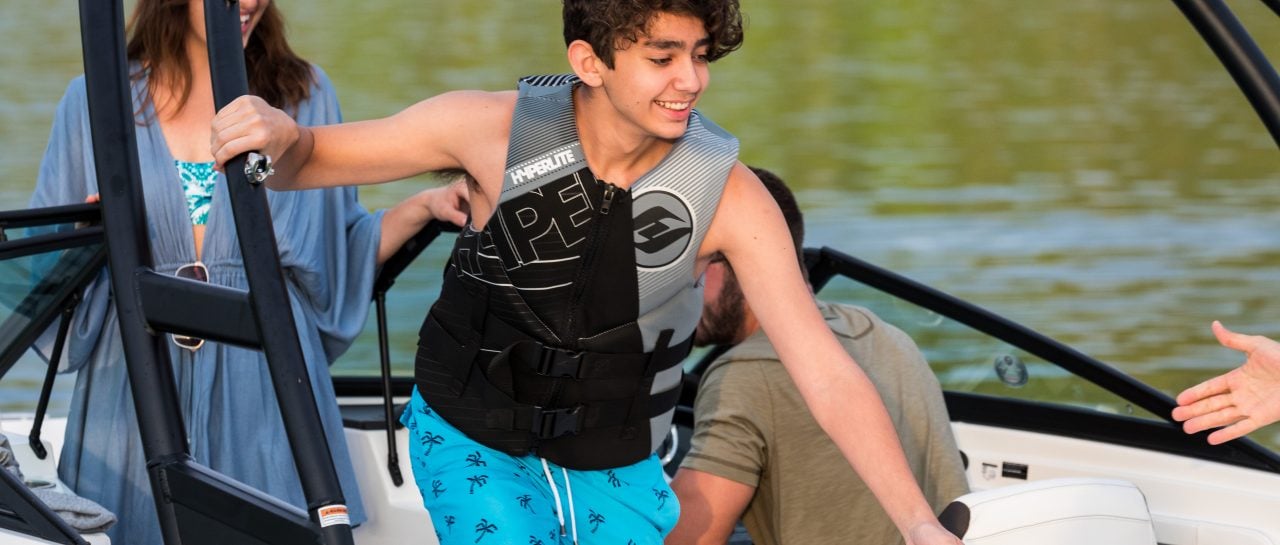Boating Safety

As you prepare for your day on water, it is essential that you familiarize yourself with boating safety guidelines. Whether you’re a well-seasoned captain or a first-time boater, you should keep in mind these safety tips:
Basic Safety Tips
Wear a Life Jacket: Life jackets save lives. Always make sure that everyone on board is wearing a life jacket. Check the jacket’s label to make sure it is approved by the coast guard. Also, make sure that the jackets fit right, given your passengers’ size and weight. Many states mandate wearing a life jacket for children under a specified age.
Proper Boarding: All of your passengers should be in a designated position. Hold on to grab rails and make sure no one is in a position to possibly fall overboard. You must adhere to the maximum person and total weight capacity of the boat. Plan the number of passengers and other items that you want to bring onboard accordingly. Overloading a boat can lead to capsizing. Use care when boarding and disembarking from the boat, especially on floating docks and during inclement conditions.
Stay Clear of Propeller: It is advisable to turn off the engines before passengers board or exit the boat. Propellers should not be spinning when someone is off the boat. Take extra caution in case of tubers or skiers, or if you are boating near swimmers.
Avoid Carbon Monoxide Poisoning: Carbon monoxide (CO) is an odorless, tasteless gas that can cause poisoning and even death if consumed at high concentrations. To prevent CO poisoning, avoid excessive idling and inspect your exhaust system regularly to ensure it is venting appropriately.
Mind Your Surroundings: You should be mindful of not only your boat, but also other boaters and individuals or objects in your vicinity. Even when you are leisurely boating, you may need to maneuver your boat to prevent an incident if other boaters are not as careful.
Check the Weather: Be aware of the weather forecast for your boating day and prepare accordingly. Always check for wind speed, wind direction, wave height, and any weather advisories to ensure that it is safe to go out on water. Wind and lightning arrive quickly on the water and can present a serious safety hazard. If the weather gets bad while you are on the water, find the safest way back to the marina.
Carry Multiple Communication Devices: Having multiple forms of communication can come in handy. If required, you can call for help from your cellphone, but depending on where you are boating, you may not get service on your cellphone. Having a VHFFH radio onboard will help you out in that situation. when out of cellular service range.
Be a Sober Skipper - Don’t Drink & Boat: Everyone loves to have a good time on water, but you should never operate a boat while you are under the influence. If you plan to consume alcohol, designate someone to captain the boat who would not be drinking.
Pre-departure Checklist
Personal Flotation Devices (Life Jackets) - At least one Coast Guard-approved PFD onboard per passenger (minimum of two PFDs).
Sound Signals - At least two sound-signaling devices such as an air horn, whistle or bell.
Visual Distress Signals – e.g. Flare guns. Passengers should know where these are located.
Navigation Lights – In working condition.
Fire Extinguishers - Store in an accessible place and check that it's securely mounted and not expired.
Ventilation – For Gas engines.
Backfire Flame Control – For Gas engines except outboards.
Crew Briefing – When welcoming new passengers aboard your boat, provide a short briefing on vessel safety. Focus on life jacket usage, fire extinguisher location, distress signaling tool location and use, proper seating locations when underway, docking procedures, emergency VHF radio operation, and any other geographic/boat relevant points.
Vessel Safety Check
The Coast Guard recommends that you have your boat inspected briefly by a certified examiner to ensure you are in compliance with all state and federal boating laws. All recreational boaters can take advantage of the free Vessel Safety Check program every year. The check is performed by a certified Vessel Examiner, at a mutually convenient time, and usually takes 30 to 45 minutes, depending upon the size of your boat. Boats that pass the examination are awarded a distinctive VSC Decal that alerts the Coast Guard, Harbor Patrol and other law-enforcement agencies that your boat was found to be in full compliance with all Federal and State boating laws.


